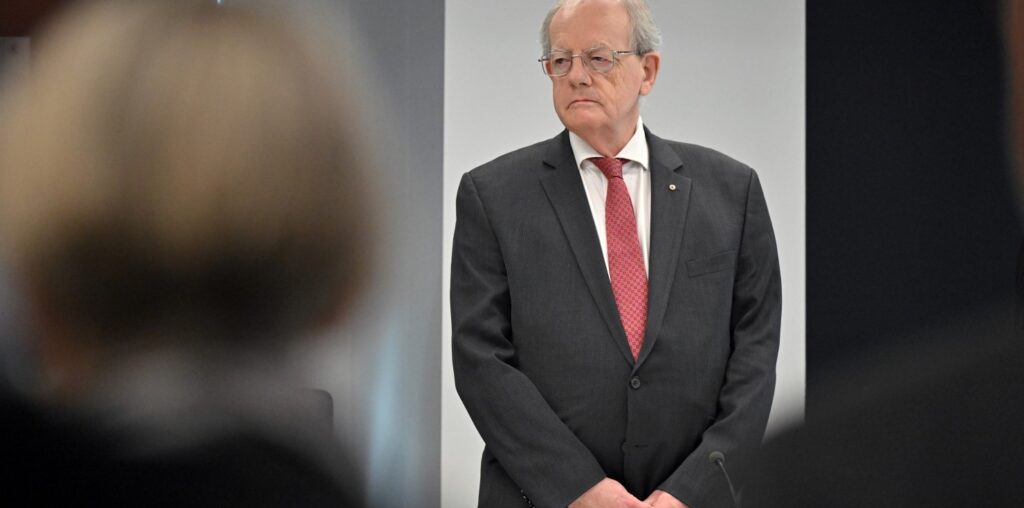C’est magnifique, mais ce n’est pas la guerre, might we have muttered at the sinking of the National Anti-Corruption Commission (NACC), the ship that torpedoed itself.
If the NACC was, as many suspect, set up to fail by the duopolists of the two major parties, the people they put in charge could not have served them better.
The NACC’s decision that there was nothing left worth discussing in the aftermath of the robodebt catastrophe — with a justification that read to the scandal’s victims like “too hard, can’t be bothered” —was a death blow to the agency’s standing as an instrument for restoring public faith in government.
The fallout included conspiracy theories focused on the NACC’s head commissioner, Paul Brereton AM RFD SC, specifically his alleged friendship with Kathryn Campbell, former head of the Department of Social Services, a key architect and defender of robodebt and one of the six individuals the robodebt royal commissioner Catherine Holmes had referred to the NACC for investigation of possible corrupt conduct.
Brereton and Campbell were high-ranking officers in the Australian Army Reserve, and photos of them looking happy together in their uniforms were circling the toilet bowl of social media along with the NACC’s reputation.
It turns out, in the polite euphemisms of the law, that the Brereton-Campbell relationship had corrupted the anti-corruption watchdog.
One fortunate feature of the NACC’s enabling legislation was the creation of a watchdog for the watchdog: the office of the inspector of the NACC, independent of the commission, occupied inaugurally by Gail Furness SC.
As part of her oversight function, Furness decided to investigate the NACC’s decision to do nothing about robodebt.
By contrast with the NACC’s addiction to secrecy, Furness has published her whole report. The story it tells is not one of Sofronoff-level weirdness, but it’s not good.
According to Brereton’s declaration of a perceived conflict of interest at the time, Campbell was “well known” to him. He considered it to be short of an actual conflict since they were professional rather than personal colleagues, but it was close enough to trigger the perception of a potential conflict in the eyes of the hypothetical reasonable observer.
Properly, Brereton told the NACC and the government, determining that one of his deputy commissioners should lead the investigation into the six referred individuals and that he would “not be involved in any decisions concerning [Campbell]”.
Holmes referred the Robodebt Six to the NACC on July 6, 2023. Brereton declared his conflict the following day.
The NACC did its work and, on October 19, 2023, its senior assessment panel met to consider the robodebt case. And here’s where it gets weird. The person chairing the panel, and the meeting, was Brereton.
The meeting took an hour; that’s the whole deliberation the NACC’s decision-makers gave to robodebt, with the exception of one of the six referrals: Person 6, the only one who hadn’t been a public servant (Furness records that they must have been a government minister). A review of options for dealing with Person 6 continued until the following March, culminating in the same outcome as the others: no further action.
Finally, in April this year, the deputy commissioner delivered the public verdict: there was “no public value” in the NACC conducting an investigation at all into the Robodebt Six’s conduct.
Furness did not review that decision. Her focus was on whether it had been potentially infected by Brereton’s conflict. She concluded that it had: the commissioner had failed to “manage” his conflict of interest. His “involvement in the decision-making was comprehensive, before, during and after the 19 October meeting”. In short, having declared his conflict, he had not taken the second essential step: removing himself from the scene altogether.
The problem would have been visible from the moon: he’s the boss, and he stayed in the room, even chairing the meeting that made the decision to do nothing about Campbell and the others. Furness’ description of it as an “error of judgment” is very kind, given that a lawyer as senior as Brereton could not have been unaware of how wrong his actions were.
The formal consequence is that Brereton has been found to have engaged in “officer misconduct”, which sounds unlawful but in the language of the NACC Act is not. It’s just not kosher, and it rendered the NACC’s process unreliable.
Furness recommended that Brereton appoint an “appropriate person” to reconsider the robodebt decision, and the NACC has announced it will find an “eminent person” to fill that role. Irony alert: the NACC has so screwed itself, it now has to outsource its one job.
It gets worse: as Furness’ report discloses, before the NACC made public its robodebt decision, it circulated its draft media release to the lawyers acting for the Robodebt Six, so they could vet its wording. Which they did, requesting changes that watered it down, which the NACC accepted.
Yes, you read that right: the people the NACC was supposed to investigate over alleged corrupt conduct were allowed to help redraft the wording of the decision that let them off the hook.
The calls for Brereton to resign are likely to prove irresistible, and he should probably read the room.
As for the NACC itself, towing it out to sea and sinking it might be the best option now. It may think what it’s been doing is magnificent, but it sure isn’t law.
Can the NACC be saved? Or should we blow it up and start again? Let us know your thoughts by writing to letters@crikey.com.au. Please include your full name to be considered for publication. We reserve the right to edit for length and clarity.

